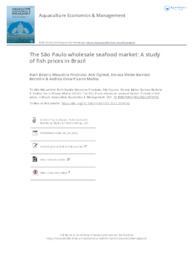The São Paulo wholesale seafood market: A study of fish prices in Brazil.
The São Paulo wholesale seafood market: A study of fish prices in Brazil.
Author(s): PINCINATO, R. B. M.; OGLEND, A.; BERTOLINI, R. M. B.; MUÑOZ, A. E. P.
Summary: We analyze fish pricing in the São Paulo wholesale market, the second largest seafood market in South America. Quantitative price analysis is complemented by interviews with participants in the value chain to answer how the multitude of fish products supplied in this market are related and the challenges facing future growth. The results reveal a clear separate pricing of domestically produced fishery species (whitefish and pelagics) from the internationally traded aquaculture species (tilapia and salmon). Tilapia and salmon are uniquely priced, less volatile and more persistent with a price dynamic more akin to local terrestrial meats. Fishery prices show large month-by-month fluctuations and compete more with each other. Participants in the different levels of the value chain corroborate the uniqueness of salmon and state a preference for stable availability and low prices, with less concern about the specific sourcing of fish (aquaculture/fisher, or domestic/imported).
Publication year: 2022
Types of publication: Journal article
Keywords: Aquaculture, Aquicultura, Fisheries, Food prices, Importação, Imports, Market analysis, Mercado Nacional, Peixe, Preço, Seafoods, São Paulo, Wholesale marketing
Observation
Some of Embrapa's publications are published as ePub files. To read them, use or download one of the following free software options to your computer or mobile device. Android: Google Play Books; IOS: iBooks; Windows and Linux: Calibre.
Access other publications
Access the Agricultural Research Database (BDPA) to consult Embrapa's full library collection and records.
Visit Embrapa Bookstore to purchase books and other publications sold by Embrapa.

